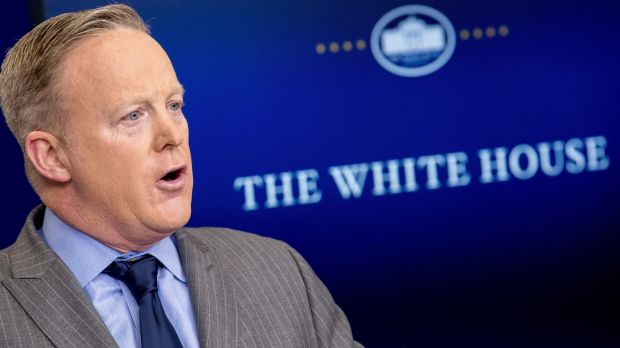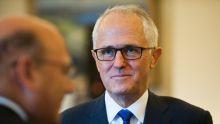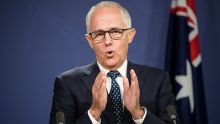Washington: Read all about it! The Washington Post reports favourable comments on President Trump. Read all about it!
After back-firing in the immediate aftermath of Friday's inauguration, it seems Team Trump must have had a bit of a think overnight Sunday, and figured they had lost it through the weekend – and perhaps that if they really do want to discredit and destroy the news media, then maybe Trump's first days in office weren't the best time to go to the mattresses against what is, after all, a supposed pillar of democracy.
More World News Videos
White House defends inauguration claims
White House spokesman Sean Spicer defends his statement that President Donald Trump's inauguration was the most-watched ever.
All this can be inferred from the conduct of Trump spokesman Sean Spicer.
On Saturday, he was off the reservation, lying as he hammered reporters for reporting the size of the crowd at the inauguration – and then storming out of the briefing without taking questions. But on Monday, there he was making nice, as Americans say, with reporters – answering question after question for 90 long minutes and even throwing in a few self-deprecating jokes.
And that was the context in which Spicer confessed the Trump team's feelings of injury and hurt, even demoralisation, over being subjected to the rough and tumble of the political reporting machine.
But first the news: In the morning, Trump had a business breakfast, at which he urged attendees to make submissions within 30 day on taxes on imports and exports. And in the afternoon he met union leaders, nice context for the executive order he released cancelling any US role in the Trans Pacific Partnership, an Obama trade deal that was to involve 12 countries – including Australia.
Union boss Richard Trumka cheered Trump's TPP decision and urged more action, the Post reported, and Dow Chemical CEO Andrew Liveris, reassured business on Trump's border tax plans – "he's not going to do anything to harm competitiveness".
After trade, the other campaign signature issue that Trump addressed on Monday was abortion, reviving a Reagan-era ban on US aid donations to foreign health care providers that offer abortion counselling where it is available, or lobby for it in countries in which abortion is banned.

It could be described as an ordinary first day at the office, but we can't speak in such terms because it might upset the Trumpettes. But its pedestrian nature was all the more apparent because of how the Trump team conducted themselves through the weekend and because of their claims that they would be the best administration and that they were ready to go.
"Our job is to be ready on Day 1," Vice-President Mike Pence declared last week. "The American people can be confident that we will be."

And for good or ill, the way media work in this town, they hold things up to the light and they compare and contrast; they treat the improbable as improbable and the mundane as mundane – and if Dr Jekyll is at the lectern in the press briefing room today, they ask what happened to Mr Hyde.
This was the context in which Spicer's first formal briefing inevitably went back to the issue of crowd sizes – for the Trump inauguration as compared with Saturday's women's march and the two Obama inaugurations.

The questions were about why – why did Trump think it was appropriate to use a Saturday speech to staff of the CIA to bang on about his "war with the media," and why was he, Spicer, sent into the briefing room on the same day to tell demonstrable lies on the crowd issue – especially when the new administration had such bigger fish to fry.
Spicer must have felt he was on a therapist's couch, because he opened up – and it's worth reading at length.

Spicer: I will tell you it's not, it's not just about a crowd size. It's about this constant - you know, he's not going to run. Then if he runs, he's going to drop out. Then if he runs, he can't win, there's no way he can win Pennsylvania, there's no way he can win Michigan. There is this constant theme to undercut the enormous support that he has. And I think that it's just unbelievably frustrating when you're continually told it's not big enough, it's not good enough, you can't win.
Question: And, and if I may…

Spicer: Hold on, because I, I think it's important. He's gone out there and defied the odds over and over and over again. And he keeps getting told what he can't do by this narrative that's out there. And he exceeds it every single time. And I think there's an overall frustration when you -- when you turn on the television over and over again and get told that there's this narrative that you didn't win. You weren't going to run. You can't pick up this state.
But when you're constantly getting told that can't be true, we doubt that you can do this, this won't happen, and that's the narrative when you turn on television every single day, it's a little frustrating.

And I think that for those people around him, his senior team especially, but so many of the other folks that are either here in the administration, that gave up their time during the transition, they left a job to work for three or four weeks because they are so committed to having his nominees get through, it's a little demoralising to turn on the TV day after day and hear, can't do this, this guy's not going to get confirmed, not way they're going to go through.
Question: But isn't that just part of the conversation that happens in Washington...
Spicer: No, it's not. I think... And I think that it's important to understand, that whether it's the president himself, the vice-president, the senior team, the volunteers or the people who are out there just in America that voted for him or walked the streets or put up a sign, that to constantly be told no, no, no and watch him go yes, yes, yes every time and to come up to the next hurdle and see someone put a block up gets a little frustrating.
Question: Isn't it a fair criticism that you've got bigger fish to fry? Why worry about a couple of tweets about crowd size?
Spicer: Because it's not -- because that's what I'm saying, you're minimising the point here, Jim. It's not about one Tweet. It's not about one picture. It's about a constant theme. It's about sitting here every time and being told no. "Well, we don't think he can do that, he'll never accomplish that, he can't win that, it won't be the biggest, it's not gonna be that good. The crowds aren't that big, he's not that successful."
The narrative -- and the default narrative is always negative and it's demoralising. And I think that when you sit here and you realise the sacrifice the guy made, leaving a very, very successful business because he really cares about this country and he wants -- despite your partisan differences, he cares about making this country better for everybody. He wants to make it safer for everybody. And so when you wake up everyday and that's what you're seeing over and over again and you're not seeing stories about the Cabinet folks that he's appointing or the success that he's having trying to keep American jobs here. Yes, it is a little disappointing."
With all that in mind we need to tread carefully, lest we cause further frustration or demoralisation, by noting that a team of prominent constitutional experts have not been drinking the Trump Kool Aid and they're off to court – charging that as president, Trump is violating the constitution because his hotels and other businesses accept payments from foreign governments.
Very demoralising. Very frustrating.

















